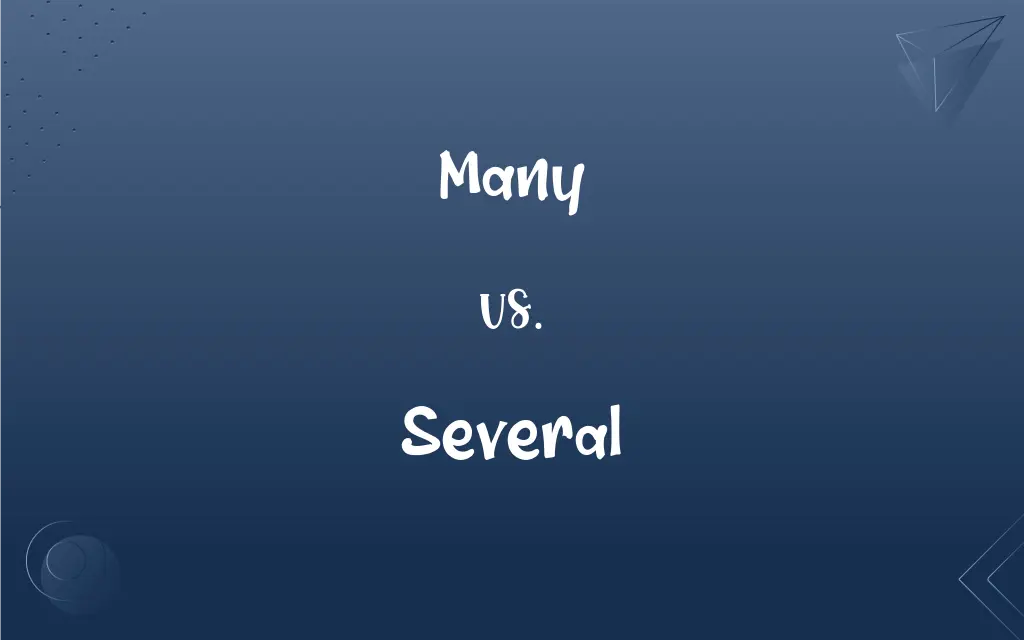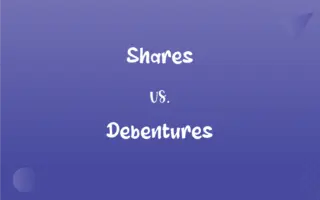Many vs. Several: What's the Difference?
Edited by Janet White || By Harlon Moss || Updated on October 9, 2023
"Many" refers to a large indefinite number, while "several" denotes more than a few but not a large number.

Key Differences
"Many" and "several" are quantifiers that denote an unspecified amount of something, but they’re used in slightly different contexts and carry different nuances of meaning. "Many" generally refers to a large, indefinite number of items or individuals, signaling an abundance or a high quantity of entities, without providing a specific count. On the other hand, "several" implies more than a couple but not a large number of items or people, being somewhat vague but often assumed to be a small handful or a few, providing a sense of a manageable or smaller set than "many." Thus, while both words are unspecific quantifiers, “many” hints at a more substantial quantity, whereas “several” tends to indicate a modest number.
In the context of social gatherings, if one says that many people attended a concert, it implies a large crowd, potentially in the hundreds or thousands, thereby highlighting a notable abundance of attendees. In contrast, if one says that several people attended a small party, it conveys the idea that more than just two or three individuals were present, but not necessarily a very large group, perhaps something more akin to a gathering of five to ten individuals. Both terms are versatile and dependent on context, but "many" typically alludes to a notably larger quantity than "several."
Taking a linguistic lens, the word "many" is often employed in language to convey a generalized, substantial quantity, potentially implying an overwhelming or notable abundance, without being numerically specific. Alternatively, "several" is utilized to express a more contained, manageable quantity, potentially implying a more intimate or less overwhelming set, without indicating an exact number. Both words leave the actual quantity unspecified and open to interpretation, allowing for flexibility in description, with “many” often indicating a larger set and “several” a smaller set.
When discussing items or objects, saying that many objects were found in a room might suggest a cluttered or densely packed space, with a notably high number of items present. Saying that several objects were found in a box, however, implies that more than a couple but not an excessively high number of items were discovered, suggesting a more limited and potentially less overwhelming quantity. Consequently, the choice between “many” and “several” subtly shapes the reader’s or listener’s perception of quantity and scale, with “many” leaning towards abundance and “several” hinting at a more restrained amount.
In an educational context, if a teacher says that many students struggled with a difficult concept, it implies that a large portion of the class found the material challenging, potentially indicating a widespread issue. Conversely, if the teacher notes that several students excelled in a particular subject, it suggests that more than a few but not an overwhelmingly large number of students performed exceptionally well, indicating a smaller subset of the larger group. Therefore, in such instances, “many” tends to indicate a broader, more generalized occurrence, while “several” hints at a more specific, potentially isolated occurrence.
ADVERTISEMENT
Comparison Chart
Quantity
Large number
More than a few but not many
Used with
Countable nouns
Both countable and non-countable nouns
Indication
Generally more than "several"
Generally less than "many"
Definition
Large indefinite number
A small number, more than a couple
Relative Amount
More tasks = many tasks
Few tasks = several tasks
ADVERTISEMENT
Many and Several Definitions
Many
"Many" is an indefinite quantifier.
There were many reasons behind his decision.
Several
"Several" implies more than a few but not a lot.
She visited Paris several times.
Many
"Many" emphasizes a significant amount.
He faced many challenges during the project.
Several
"Several" is typically more than two but less than many.
I have several assignments to complete.
Many
"Many" often suggests a number too large to easily count.
Many stars are visible in the night sky.
Several
"Several" can describe a modest number.
There are several options to consider.
Many
"Many" typically pairs with countable nouns.
Many people attended the conference.
Several
"Several" pairs with both countable and non-countable nouns.
She gave several reasons for her absence.
Many
"Many" indicates a large quantity.
She has read many books.
Several
"Several" does not specify an exact number but suggests diversity.
He bought several types of fruit.
Many
Amounting to or consisting of a large indefinite number
Many friends.
Several
Being of a number more than two or three but not many
Several miles away.
Many
Being one of a large indefinite number; numerous
Many a child.
Many another day.
Many
The majority of the people; the masses
"The many fail, the one succeeds" (Tennyson).
FAQs
Is "many" used for countable or uncountable nouns?
"Many" is primarily used with countable nouns.
Which is greater: many or several?
"Many" usually suggests a greater number than "several."
Can I use "many" and "several" interchangeably?
While similar, context matters; they aren't always interchangeable.
When should I use "many"?
Use "many" when referring to a notably large quantity or amount.
How is "several" defined?
"Several" means more than a few but not a large number.
Does "several" mean seven?
No, "several" is indefinite and doesn't specify a particular number.
Are "many" and "several" formal words?
Both can be used in formal and informal contexts.
Can "many" be used to emphasize?
Yes, "many" can be used for emphasis when describing a large amount.
Can "several" refer to diverse elements within a group?
Yes, "several" can suggest various elements within a set.
Can "several" be used for non-countable nouns?
Yes, "several" can be used for both countable and non-countable nouns.
When is "several" appropriate?
Use "several" for a modest number, more than a couple but not a lot.
Is "several" vague?
"Several" is somewhat vague, as it doesn't pinpoint an exact number.
What does "many" imply?
"Many" implies a large quantity or number.
Is there an exact number for "many"?
No, "many" is an indefinite number, suggesting a large quantity.
Can "several" refer to variety?
Yes, it can suggest a diverse but not extensive group.
How do native speakers interpret "many"?
They usually perceive it as a significant amount or number.
How do native speakers interpret "several"?
They typically understand it as more than a few but not overwhelmingly many.
Can "many" suggest a majority?
Yes, in some contexts, "many" can imply most of a group.
Can "many" be subjective?
Yes, what one person views as "many" might be viewed differently by another.
About Author
Written by
Harlon MossHarlon is a seasoned quality moderator and accomplished content writer for Difference Wiki. An alumnus of the prestigious University of California, he earned his degree in Computer Science. Leveraging his academic background, Harlon brings a meticulous and informed perspective to his work, ensuring content accuracy and excellence.
Edited by
Janet WhiteJanet White has been an esteemed writer and blogger for Difference Wiki. Holding a Master's degree in Science and Medical Journalism from the prestigious Boston University, she has consistently demonstrated her expertise and passion for her field. When she's not immersed in her work, Janet relishes her time exercising, delving into a good book, and cherishing moments with friends and family.
































































